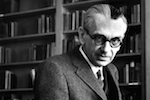A logical paradox at the heart of mathematics and computer science turns out to have implications for the real world, making a basic question about matter fundamentally unanswerable.
In 1931, Austrian-born mathematician Kurt Gödel shook the academic world when he announced that some statements are ‘undecidable’, meaning that it is impossible to prove them either true or false. Three researchers have now found that the same principle makes it impossible to calculate an important property of a material — the gaps between the lowest energy levels of its electrons — from an idealized model of its atoms.
The result also raises the possibility that a related problem in particle physics — which has a US$1-million prize attached to it — could be similarly unsolvable, says Toby Cubitt, a quantum-information theorist at University College London and one of the authors of the study.
To read more, click here.
